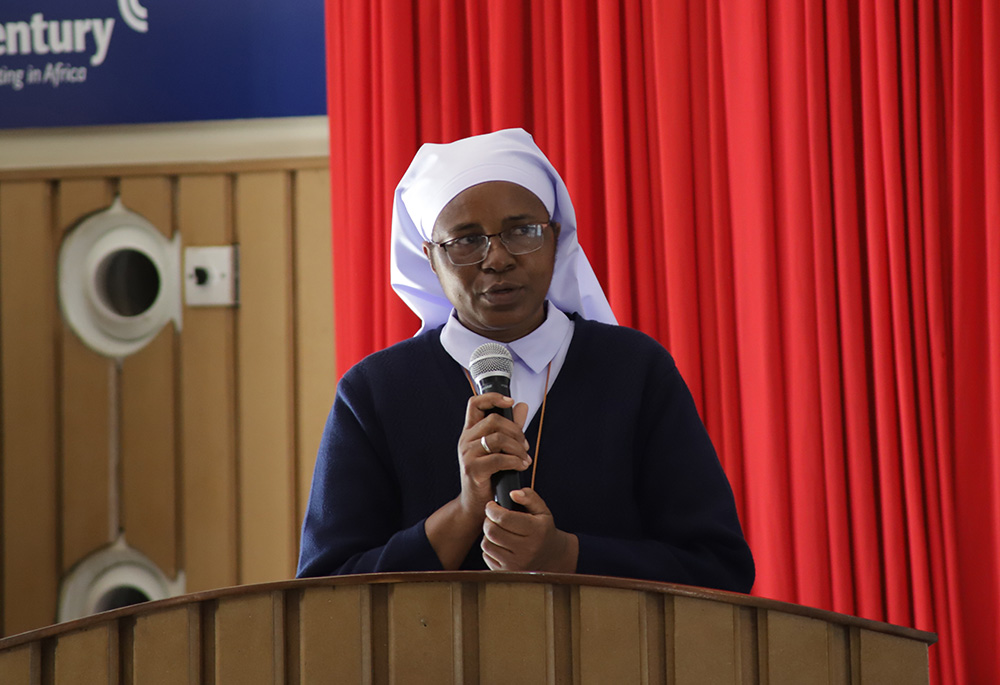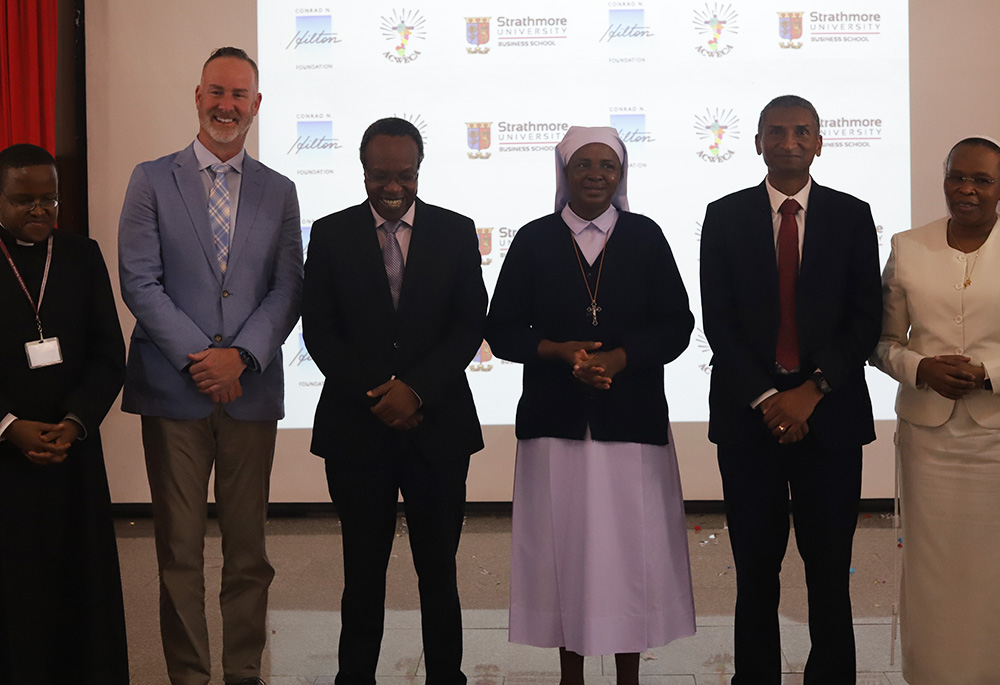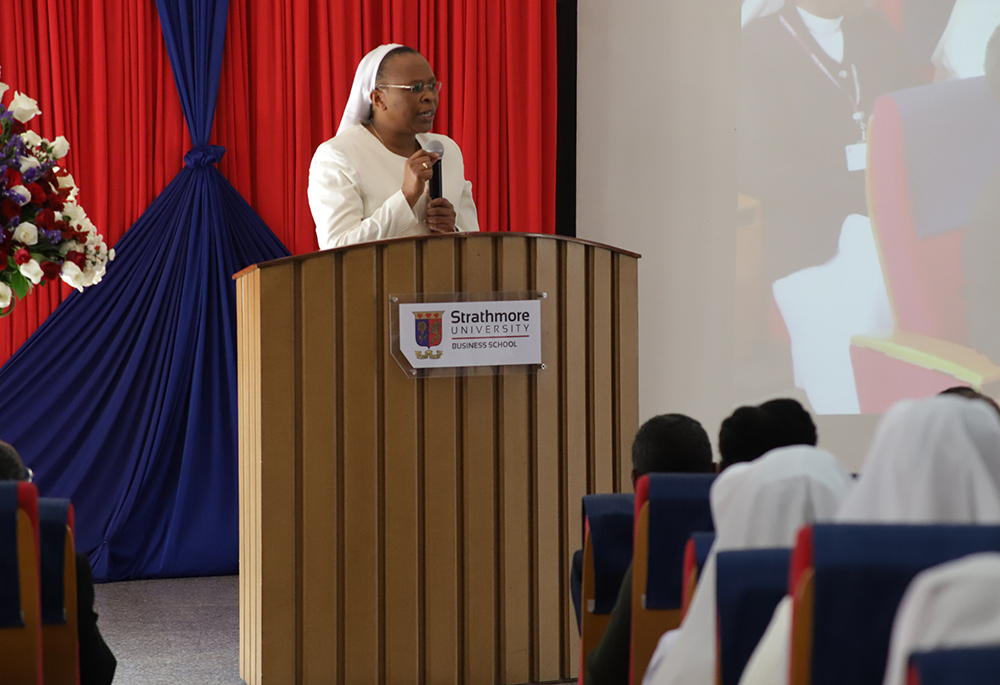
Sr. Bridgita Samba, secretary general of the Association of Consecrated Women in Eastern and Central Africa (ACWECA), speaks to members of the Hilton Foundation, the Strathmore University Business School faculty and other women religious attending the Sisters' Blended Value Project launch April 27 at the university in Nairobi, Kenya. (Wycliff Oundo)
A program that for four years has helped sisters' ministries become financially self-sufficient has launched a revitalized version of the project that will help sisters access resources in four African countries.
On April 27, the Sisters' Blended Value Project started a new phase thanks to a partnership with the Strathmore University Business School in Nairobi and the Association of Consecrated Women in Eastern and Central Africa, or ACWECA, with funding from the Conrad N. Hilton Foundation. (The Hilton Foundation is a major funder of Global Sisters Report.)
The Sisters' Blended Value Project — "blended value" because it combines profitability with social benefit — is intended to help Catholic sisters acquire skills in starting and managing income-generating activities to sustain the work of their religious congregations. It was founded in 2018 during the Third Vatican Conference on Impact Investing in Rome with an aim to move congregations of Catholic sisters from being donor-dependent to self-reliant. The project will launch in phases in four countries: Kenya, Uganda, Tanzania and Zambia.
The April 27 relaunch, which took place at the Strathmore University Business School, was attended by St. Joseph Sr. Bridgita Samba, secretary general of the Association of Consecrated Women in Eastern and Central Africa; Sr. Jane Wakahiu of the Little Sisters of St. Francis, the associate vice president of program operations and head of the Catholic Sisters Initiative at the Hilton Foundation; and Marc Holley, vice president of strategy and programs at the Hilton Foundation.
Keynote speakers at the launch identified the Sisters' Blended Value Project's areas of focus to be development in social entrepreneurship; the establishment of collaborative networks and communities of practice; research; the foundation of an innovation lab; and integrated financial solutions.
"We have received so many requests from individual sisters and congregations to be a part of the SBVP, yet we can only work with as many as our current capacity allows," Samba said. "We hope to expand the program to all the national associations in the regions as well as bring more congregations and sisters on board to achieve our goal of positively empowering consecrated women with entrepreneurial skills for deeper social evangelization."

From left: Fr. Charles Mundia, Strathmore University chaplain; Marc Holley, vice president of strategy and programs at the Conrad N. Hilton Foundation; George Njenga, executive dean of the Strathmore University Business School; Sr. Bridgita Samba, secretary general of the Association of Consecrated Women in Eastern and Central Africa (ACWECA); Vincent Ogutu, vice-chancellor designate of Strathmore University; and Sr. Jane Wakahiu, the associate vice president of program operations and head of the Catholic Sisters Initiative at the Hilton Foundation pose for a photo after officially launching the next phase of the Sisters' Blended Value Project on April 27 at Strathmore University Business School in Nairobi, Kenya. (Wycliff Oundo)
She acknowledged the support of the Strathmore University Business School and the Hilton Foundation as well as "everyone who worked tirelessly with our ACWECA SBVP coordinator and devoted their energy, time, resources for the benefit of all sisters in the communities they serve."
Wakahiu spoke of the motivation to initiate the project four years ago with Holley and Angelique Mutombo, the senior program officer for Catholic sisters in Africa at the Hilton Foundation, in a cafe in Karen, a suburb of Nairobi.
"While we had coffee, we discussed how we could enlist the help of Strathmore University to find ways to support sisters and transform their social ministries into social enterprises," she said.
Wakahiu said most women religious still depend on aid from foreign countries and have applied charitable models in their social ministries, which hamper their self-sustainability.

Sr. Jane Wakahiu speaks to attendees at the April 27 launch of the new phase of the Sisters' Blended Value Project at the Strathmore University Business School in Nairobi, Kenya. (Wycliff Oundo)
"The little income that sisters earn, they put back into the communities that they serve," she said. "These are mostly rural communities with many needy people. With this kind of model, their ministries cannot be self-sustainable."
She encouraged sisters to think of innovative ways in which they could sustain their ministries while continuing their missions of charity, which she emphasized could not be done away with.
"We have to think out of the box and come up with strategies that will ensure our social ministries are transformed into sustainable missions that will acquire more resources, which can be put back into those ministries and continue giving life to needy people and become social agents of change," Wakahiu said.
She hailed partnership and collaboration as the best strategies for maximizing the project's impact.
"If we go alone, we will go on for sure, but if we go together, we will go further in not only transforming sisters' ministries to social enterprises but also accompanying women religious by giving them agency in education, health care, social services, and any other ministries, particularly here in Africa," she said.
Advertisement
Holley highlighted the project's local partnerships and spoke on how to include entrepreneurship in Christian philanthropic approaches.
"This project embodies stewardship, humility, compassion, integrity and, most importantly thinking big," he said.
He encouraged sisters to include local participation as they implement the project, saying they "understand the problems they face, they understand their communities. That's why they are the most likely to have insights into solutions for these issues."
He praised the partnership with the Strathmore University Business School, which he acknowledged as a local institution established in Kenya and thus the best partner in compiling recommendations to transform the social ministries of women religious into sustainable social enterprises.
"Strathmore University is part of this community," he said. "It gives back to the community, and I think this partnership is a wonderful idea and a great moment of inspiration to establish this program and to see it finally come to life."







